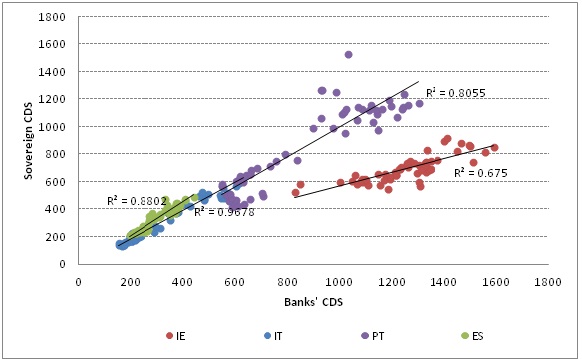Blog Post
Chart of the week: banking and sovereign risk: is it banks’ holding of government debt or banks’ location?
Since the start of the European sovereign debt crisis, the interdependence between banks and sovereign risk has been emphasised. This week's chart shows the positive correlation between sovereign and bank credit default swaps (CDS) for a number of euro-area countries during 2011.
Since the start of the European sovereign debt crisis, the interdependence between banks and sovereign risk has been emphasised. The figure below shows the positive correlation between sovereign and bank credit default swaps (CDS) for a number of euro-area countries during 2011.

Source: Bruegel calculations with data from Datastream and Macrobond.
Note: Weekly averages from January 2011 to February2012. Banking CDS by country are calculated as weighted averages of CDS of the individual banks considered for each country. The graph for Greece is not displayed since it is characterised by hyperbolic pattern.
A recent article in the FT suggests that this deadly link between sovereign and banking risk has become worse due to increased government bond purchases following the LTRO, see our post of yesterday on the topic. In our recent paper we study a sample of banks across Europe. The evidence suggests that government bond holdings of banks may not be the main reason for the strong correlation of risk. In fact, we show only a relatively weak correlation between the banks’ risk or stock market performance and their holdings of government debt. In other words, a bank in – say Spain – has lost market value in 2011 but the loss was equally high for a bank holding a lot or very little Spanish government debt. We also find that such a correlation exists even in Germany and France.
These empirical findings suggest that the channel of banks’ holdings of sovereign debt poorly explains the sovereign-banking link. Rather, the location of banks plays a prominent role for their performance in financial markets. Thus, addressing this perceived country risk at euro area level requires the creation of a common guarantee mechanism for European banks: in other words, a banking union.
Republishing and referencing
Bruegel considers itself a public good and takes no institutional standpoint. Anyone is free to republish and/or quote this post without prior consent. Please provide a full reference, clearly stating Bruegel and the relevant author as the source, and include a prominent hyperlink to the original post.








